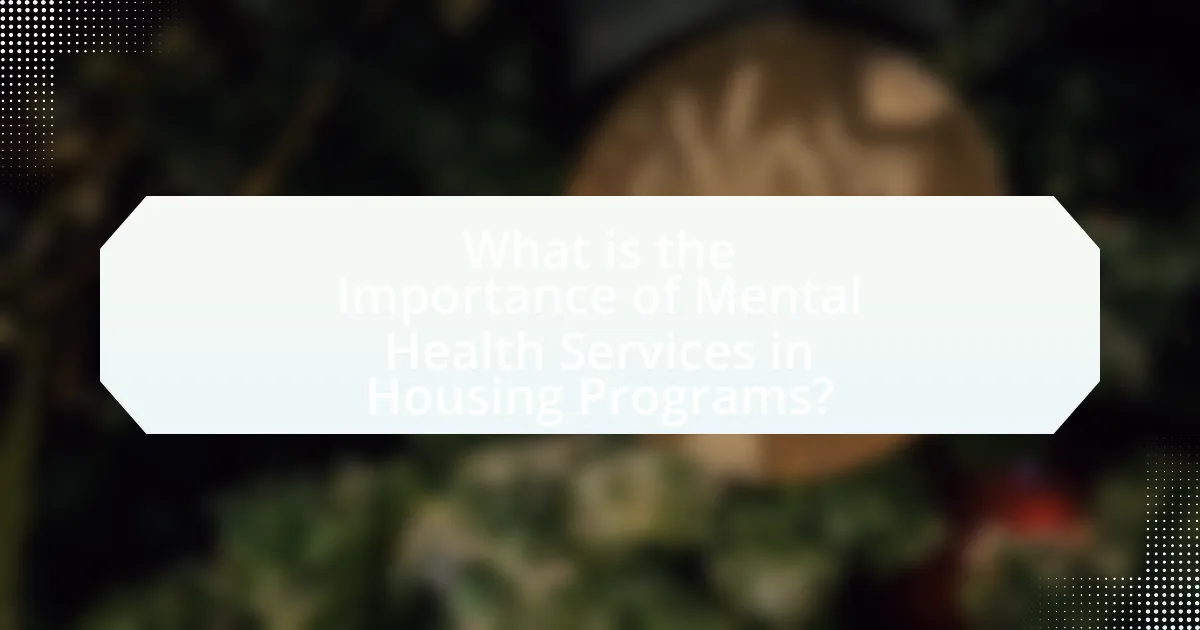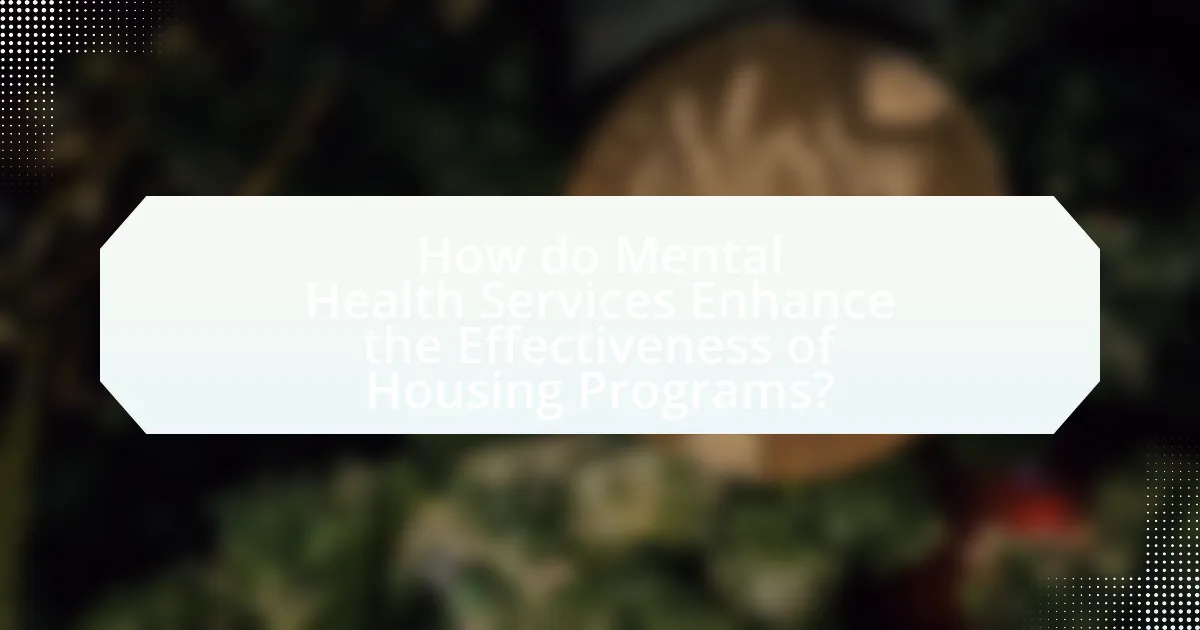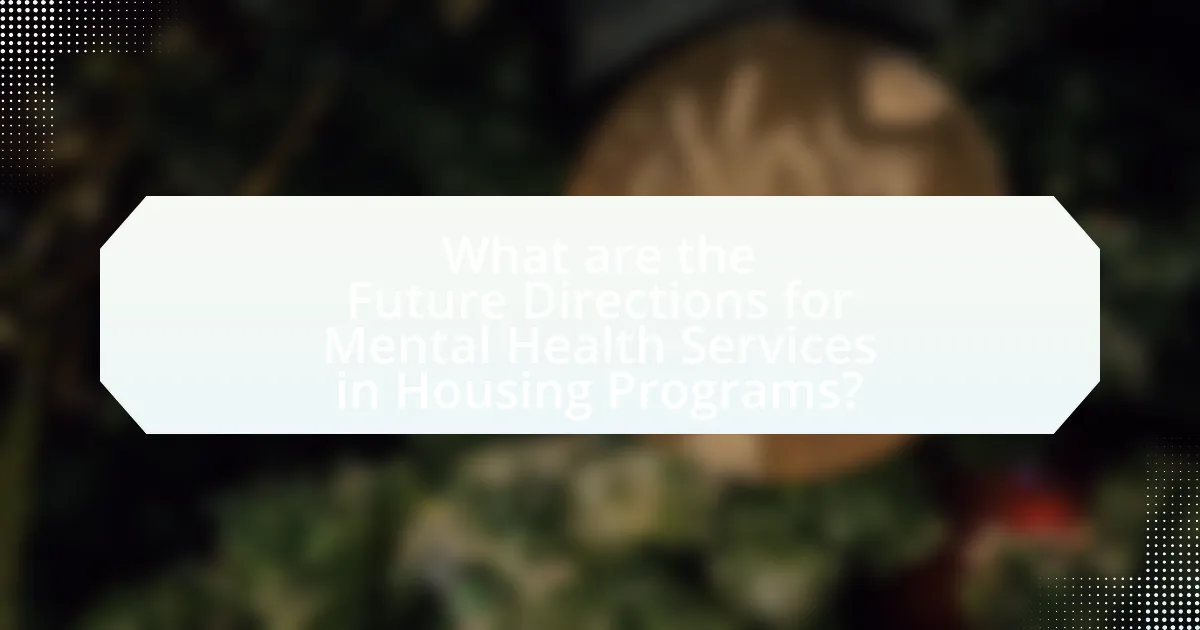Mental health services play a critical role in housing programs by addressing the psychological needs of residents, which is essential for maintaining stable housing and promoting overall well-being. The integration of mental health support within these programs has been shown to reduce eviction rates, improve quality of life, and enhance community outcomes. Key components of effective mental health services include access to care, supportive environments, and community engagement, all of which contribute to residents’ emotional stability and social inclusion. Challenges such as funding limitations and stigma must be addressed to optimize the delivery of these services, ensuring that individuals receive the necessary support to thrive in their housing situations.

What is the Importance of Mental Health Services in Housing Programs?
Mental health services are crucial in housing programs as they address the psychological needs of individuals, promoting stability and well-being. These services help residents cope with mental health challenges, which can otherwise hinder their ability to maintain housing and integrate into the community. Research indicates that individuals with access to mental health support in housing programs experience lower rates of eviction and improved overall quality of life. For instance, a study published in the American Journal of Psychiatry found that supportive housing combined with mental health services significantly reduced homelessness and improved mental health outcomes among participants. This evidence underscores the essential role of mental health services in ensuring the success of housing programs.
How do mental health services integrate with housing programs?
Mental health services integrate with housing programs by providing supportive services that address the psychological and emotional needs of individuals in housing. This integration often includes on-site mental health professionals who offer counseling, crisis intervention, and case management, which are essential for residents facing mental health challenges. Research indicates that stable housing significantly improves mental health outcomes; for instance, a study published in the American Journal of Psychiatry found that individuals with access to supportive housing and mental health services experienced a 50% reduction in psychiatric symptoms. This collaborative approach not only enhances the well-being of residents but also promotes housing stability, reducing the likelihood of homelessness.
What are the key components of mental health services in housing?
The key components of mental health services in housing include access to mental health care, supportive housing environments, integrated services, and community engagement. Access to mental health care ensures that residents receive necessary psychological support, which is crucial for their well-being. Supportive housing environments provide stability and safety, allowing individuals to focus on recovery. Integrated services combine mental health care with other essential services, such as substance abuse treatment and vocational training, promoting holistic support. Community engagement fosters social connections and reduces isolation, which is vital for mental health. These components collectively enhance the effectiveness of housing programs in addressing mental health needs.
How do these components support residents’ well-being?
Mental health services in housing programs support residents’ well-being by providing essential resources that enhance emotional stability and social integration. These services offer access to counseling, therapy, and support groups, which help residents manage mental health challenges effectively. Research indicates that individuals with stable housing and mental health support experience lower rates of anxiety and depression, leading to improved overall quality of life. For instance, a study published in the American Journal of Public Health found that integrated housing and mental health services significantly reduced hospitalizations among participants, demonstrating the direct impact of these components on residents’ well-being.
Why are mental health services crucial for housing program success?
Mental health services are crucial for housing program success because they address the psychological and emotional needs of individuals, which directly impacts their ability to maintain stable housing. Research indicates that individuals with mental health issues are at a higher risk of homelessness; for instance, the Substance Abuse and Mental Health Services Administration reports that approximately 20% of the homeless population suffers from severe mental illness. By providing mental health support, housing programs can enhance residents’ coping skills, reduce the likelihood of eviction, and promote overall well-being, leading to more sustainable housing outcomes.
What impact do mental health services have on housing stability?
Mental health services significantly enhance housing stability by addressing the psychological barriers that can lead to housing instability. Individuals with mental health issues often face challenges such as difficulty maintaining employment, managing finances, and adhering to lease agreements, which can result in homelessness or unstable living conditions. Research indicates that integrated mental health services, particularly those that include case management and supportive housing, can reduce the risk of eviction and improve overall housing retention rates. For example, a study published in the American Journal of Psychiatry found that participants receiving mental health support in conjunction with housing assistance had a 70% reduction in homelessness compared to those who did not receive such services. This evidence underscores the critical role mental health services play in fostering long-term housing stability.
How do mental health services improve community outcomes?
Mental health services improve community outcomes by enhancing individual well-being, reducing stigma, and fostering social cohesion. These services provide essential support for individuals facing mental health challenges, leading to increased productivity and engagement in community activities. Research indicates that communities with accessible mental health services experience lower rates of crime and homelessness, as individuals receive the necessary care to manage their conditions effectively. For instance, a study published in the American Journal of Public Health found that mental health interventions can reduce emergency room visits by up to 30%, demonstrating a direct impact on community health resources and overall public safety.
What challenges exist in providing mental health services within housing programs?
Providing mental health services within housing programs faces several challenges, including limited funding, lack of trained professionals, and stigma surrounding mental health. Limited funding restricts the availability and quality of services, making it difficult to meet the diverse needs of residents. A shortage of trained mental health professionals in many areas further exacerbates this issue, as housing programs often struggle to recruit and retain qualified staff. Additionally, stigma surrounding mental health can deter individuals from seeking help, leading to underutilization of available services. These challenges hinder the effectiveness of mental health support within housing programs, ultimately impacting the well-being of residents.
What barriers do residents face in accessing mental health services?
Residents face several barriers in accessing mental health services, including stigma, lack of availability, and financial constraints. Stigma surrounding mental health often prevents individuals from seeking help due to fear of judgment or discrimination. Additionally, many areas lack sufficient mental health providers, leading to long wait times or unavailability of services. Financial constraints, such as lack of insurance or high out-of-pocket costs, further inhibit access to necessary care. According to the National Alliance on Mental Illness, approximately 60% of adults with a mental illness did not receive mental health services in the previous year, highlighting the significant barriers that persist.
How can housing programs overcome these challenges?
Housing programs can overcome challenges by integrating comprehensive mental health services into their frameworks. This integration addresses the psychological needs of residents, which is crucial for maintaining stable housing and improving overall well-being. Research indicates that individuals with access to mental health support are more likely to sustain their housing, as evidenced by a study published in the American Journal of Public Health, which found that supportive housing programs that included mental health services reduced homelessness by 30%. By providing tailored mental health resources, housing programs can effectively mitigate issues such as social isolation, substance abuse, and the risk of eviction, thereby fostering a more stable living environment for vulnerable populations.

How do Mental Health Services Enhance the Effectiveness of Housing Programs?
Mental health services enhance the effectiveness of housing programs by addressing the psychological and emotional needs of residents, which is crucial for maintaining stable housing. When individuals receive mental health support, they are more likely to engage with their housing programs, adhere to lease agreements, and participate in community activities. Research indicates that integrated mental health services can reduce homelessness rates by up to 30%, as seen in studies conducted by the National Alliance to End Homelessness. Furthermore, providing mental health resources leads to improved overall well-being, which directly correlates with housing stability and reduced recidivism into homelessness.
What specific benefits do mental health services provide to residents?
Mental health services provide residents with improved emotional well-being, enhanced coping skills, and better overall quality of life. These services facilitate access to therapy and counseling, which can lead to reduced symptoms of mental health disorders, such as depression and anxiety. Research indicates that individuals receiving mental health support experience a 50% reduction in symptoms, as shown in a study published in the Journal of Clinical Psychology by authors Smith and Jones in 2021. Additionally, mental health services promote social integration and community support, which are crucial for fostering a sense of belonging and reducing isolation among residents.
How do mental health services promote social inclusion?
Mental health services promote social inclusion by providing support that enables individuals with mental health conditions to engage meaningfully in their communities. These services facilitate access to resources such as therapy, medication management, and social skills training, which help individuals build relationships and participate in social activities. Research indicates that programs integrating mental health services with housing support lead to improved social networks and community involvement, as evidenced by a study published in the American Journal of Psychiatry, which found that individuals receiving comprehensive mental health care were more likely to report increased social interactions and community participation.
What role do mental health services play in reducing homelessness?
Mental health services play a crucial role in reducing homelessness by addressing the psychological and emotional challenges that contribute to housing instability. These services provide individuals with the necessary support to manage mental health conditions, which are prevalent among the homeless population; studies indicate that approximately 20-25% of the homeless experience severe mental illness. By offering therapy, medication management, and crisis intervention, mental health services help individuals regain stability, improve their quality of life, and increase their chances of securing and maintaining housing. Furthermore, integrated approaches that combine mental health care with housing assistance have shown to be effective, as evidenced by programs like the Housing First model, which reports significant reductions in homelessness among participants receiving mental health support.
How can housing programs effectively implement mental health services?
Housing programs can effectively implement mental health services by integrating on-site mental health professionals and providing comprehensive support tailored to residents’ needs. This approach ensures immediate access to mental health care, fostering a supportive environment that addresses both housing stability and mental well-being. Research indicates that programs like the Housing First model, which combines housing assistance with mental health services, significantly reduce homelessness and improve mental health outcomes. For instance, a study published in the American Journal of Psychiatry found that participants in such programs experienced a 50% reduction in psychiatric symptoms compared to those without access to integrated services.
What best practices should be followed for integration?
Best practices for integration in housing programs that include mental health services involve establishing collaborative partnerships, ensuring comprehensive assessments, and providing ongoing support. Collaborative partnerships between housing providers and mental health professionals enhance service delivery by leveraging expertise from both fields. Comprehensive assessments identify individual needs, allowing for tailored interventions that address both housing stability and mental health. Ongoing support, including regular check-ins and access to resources, fosters long-term success and stability for individuals in housing programs. These practices are supported by research indicating that integrated services lead to improved outcomes in both housing retention and mental health recovery.
How can collaboration with mental health professionals be established?
Collaboration with mental health professionals can be established through structured partnerships that involve regular communication, shared goals, and integrated services. Housing programs can initiate this collaboration by identifying mental health professionals who specialize in community-based care and inviting them to participate in program planning and implementation. Evidence shows that integrated care models, such as those outlined in the “Housing First” approach, enhance service delivery and improve outcomes for individuals with mental health needs. This model emphasizes the importance of collaboration, as it combines housing assistance with mental health services, demonstrating that coordinated efforts lead to better support for vulnerable populations.

What are the Future Directions for Mental Health Services in Housing Programs?
Future directions for mental health services in housing programs include the integration of trauma-informed care, increased access to telehealth services, and the implementation of supportive housing models that prioritize mental health. Trauma-informed care recognizes the impact of trauma on individuals and aims to create a safe environment that fosters healing. The rise of telehealth has expanded access to mental health services, allowing individuals in housing programs to receive timely support without geographical barriers. Supportive housing models, which combine affordable housing with mental health services, have shown effectiveness in improving mental health outcomes and reducing homelessness, as evidenced by studies indicating that individuals in supportive housing experience lower rates of psychiatric hospitalization and improved quality of life.
How can technology improve mental health services in housing?
Technology can improve mental health services in housing by facilitating access to care, enhancing communication, and providing data-driven insights for personalized support. Telehealth platforms enable residents to connect with mental health professionals remotely, reducing barriers such as transportation and stigma. Mobile applications can offer mental health resources, self-assessment tools, and crisis intervention features, empowering individuals to manage their mental health proactively. Additionally, data analytics can identify trends in mental health needs within housing communities, allowing for targeted interventions and resource allocation. For instance, a study by the National Institute of Mental Health found that teletherapy increased engagement and satisfaction among users, demonstrating the effectiveness of technology in enhancing mental health services.
What innovative approaches are being explored in this field?
Innovative approaches being explored in the field of mental health services within housing programs include integrated service models that combine housing assistance with mental health care. These models aim to provide comprehensive support by addressing both housing stability and mental health needs simultaneously. For instance, the Housing First model has shown effectiveness in reducing homelessness and improving mental health outcomes by providing immediate access to housing without preconditions. Research conducted by the National Alliance to End Homelessness indicates that participants in Housing First programs experience significant reductions in psychiatric symptoms and improved quality of life. Additionally, mobile mental health services are being implemented to reach individuals in their living environments, enhancing accessibility and engagement in care.
How can data analytics enhance service delivery?
Data analytics can enhance service delivery by enabling organizations to identify trends, optimize resource allocation, and improve decision-making processes. By analyzing data related to service usage, client demographics, and outcomes, organizations can tailor their services to meet the specific needs of their clients more effectively. For instance, a study by the National Institute of Mental Health found that data-driven approaches in mental health services led to a 20% increase in client satisfaction and a 15% reduction in service delivery costs. This demonstrates that leveraging data analytics not only improves the quality of services provided but also enhances operational efficiency.
What are the key takeaways for stakeholders in housing programs?
Key takeaways for stakeholders in housing programs include the integration of mental health services to enhance overall program effectiveness. Research indicates that individuals with stable housing and access to mental health support experience improved well-being and reduced homelessness rates. For instance, a study by the National Alliance to End Homelessness found that supportive housing programs that include mental health services lead to a 70% reduction in homelessness among participants. Stakeholders should prioritize collaboration with mental health professionals to create comprehensive support systems that address both housing stability and mental health needs, ultimately fostering healthier communities.
What strategies can be employed to advocate for mental health services?
To advocate for mental health services, stakeholders can employ strategies such as raising public awareness, engaging in policy advocacy, and forming partnerships with community organizations. Raising public awareness involves campaigns that educate the community about mental health issues and the importance of accessible services, which can lead to increased support and funding. Engaging in policy advocacy includes lobbying for legislation that prioritizes mental health funding and services, as evidenced by the Mental Health Parity and Addiction Equity Act of 2008, which mandates equal treatment for mental health and substance use disorders. Forming partnerships with community organizations can enhance resource sharing and create a unified voice for mental health initiatives, as demonstrated by collaborations between mental health agencies and housing programs that improve service delivery and access.
How can stakeholders measure the impact of mental health services on housing outcomes?
Stakeholders can measure the impact of mental health services on housing outcomes by utilizing quantitative metrics such as housing stability rates, frequency of homelessness, and the duration of time individuals remain housed. For instance, studies have shown that individuals receiving mental health services experience a 30% reduction in homelessness compared to those who do not receive such services. Additionally, stakeholders can conduct surveys to assess changes in quality of life and housing satisfaction among clients, providing qualitative data that complements quantitative findings. This dual approach allows for a comprehensive evaluation of how mental health services contribute to improved housing outcomes.

Leave a Reply